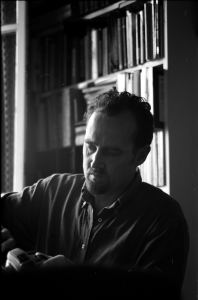Interview with Michael H. Rubin (author of The Cottoncrest Curse)
 Author of The Cottoncrest Curse today we are interviewing Michael H. Rubin; this is how he answered our usual questions…
Author of The Cottoncrest Curse today we are interviewing Michael H. Rubin; this is how he answered our usual questions…
[Q]: Hi Michael, welcome to Thrillerbooksjournal.com. Our first question is very easy: who is Michael Rubin as a person and as a writer?
[A]: Although I practice law full-time now, I’ve played jazz piano professionally in the New Orleans French Quarter and been a television and radio announcer. I am also a public speaker and humorist who has given over 400 presentations across the United States, as well as in Canada and the UK.
I enjoy playing piano, and I try to set aside some time each day to do so. For me, writing a novel is a lot like playing jazz. Both involve creating something new around a theme. In jazz, the theme is the melody and chord structure. In a novel, the theme is the plot. When I play piano, I use the theme of each musical selection as a jumping off point from which to create my own jazz interpretation, freely improvising within an identifiable structure. Writing a novel is like that for me, too. My goal is to creatively use words to develop the plot into a meaningful story, flesh-out the characters, reveal things that readers might not know or have ever thought about, and move the tale along to a satisfying conclusion.
[Q]: Where did you get the idea for The Cottoncrest Curse?
[A]: My wife and I devised the characters and plot line during many early morning walks. I was interested in writing a page-turning thriller that explored truth and identity, because both are intertwined with three universal questions that we had discussed at length while walking: Can people ever really know all the details of their family’s history? How are personal relationships affected by preconceived stereotypes and one’s own sense of identity? And, does one have an obligation to tell the unvarnished truth if doing so would be helpful to some but hurtful to others?
[Q]: Can you briefly summarize it (without telling us too much, of course)?
[A]: Two decades after the end of the Civil War, an elderly Confederate Colonel viciously slit the throat of his beautiful young wife and then fatally shot himself. Sheriff Raifer Jackson, however, believes that this may be a double homicide, and suspicion falls upon Jake Gold, an itinerant peddler who trades razor-sharp knives for fur and who has many secrets to conceal.
Jake must stay one step ahead of the law, as well as the racist Knights of the White Camellia, as he interacts with landed gentry, former slaves, crusty white field hands, crafty Cajuns, and free men of color, all while trying to keep one final promise before more lives are lost and he loses the opportunity to clear his name. The impact of these events and others that occur over the years at the Cottoncrest Plantation echo through the decades, burning a path from the cotton fields to the courthouse steps, from the moss-draped bayous of Cajun country to the bordellos of 19th century New Orleans, from the Civil War era to the Civil Rights era and across the Jim Crow decades to the Freedom Marches of the 1960s and into the present.
[Q]: Why readers might like it? Is there anything they might find difficult to accept in the book?
[A]: “The Cottoncrest Curse” will appeal to readers who like thrillers as well as to those who enjoy historical fiction. Though replete with murders, treachery, and hot pursuits, it also has comic relief. The action takes place over several generations, and occurs in an historically accurate setting.
One of the most interesting parts of my research involved making sure that the language the characters use is also historically accurate. For example, in a scene set in 1893, a grizzled, no-nonsense former Civil War physician complains that a young deputy doesn’t have “sense God gave to a large rock, a small pebble, or even a tiny dornick,” a word in common parlance at the time.
My goal was to make the story believable for readers from a wide variety of backgrounds and many different interests. Because it is grounded in historical accuracy I do not think readers will find anything in the storyline difficult to accept.
[Q]: Is Jake Gold, the protagonist, based on someone you really know?
[A]: Itinerant peddler Jake Gold was very loosely inspired by my great-grandfather, a Russian immigrant who left home at the age of twelve to escape the pogroms and forced conscription into the Russian army and who, when he finally made it to America in the late1880s, started life here as an itinerant peddler.
Jake Gold’s adventures, however, are not those of my great-grandfather. Jake is a purely fictional character. What happens to him is in no way reflective of my great grandfather’s life. On the other hand, the historic underpinning of the story is completely real.
[Q]: Are you already working on a new book?
[A]: I’ve almost finished polishing up “Privilege,” a contemporary thriller I’ve written in the film noir tradition. “Privilege” is about a laconic loner whom everyone is seeking as dead bodies keep piling up. It will be in final form shortly, ready for publishers to see.
“Privilege” is about – – – – well, here’s an excerpt from the prologue to give you a taste of what’s in store:
“Have I become a failure as a lawyer? You bet. While others were climbing up the ladder, I fell off of it.
I’ve got a broken-down office, a failed marriage, and a past-due mortgage note.
Until three weeks ago, I had no clients.
Well, no clients to speak of, except G.G. Guidry.
But now G.G. Guidry has been murdered.
And until three weeks ago, I had no money.
Except for the $4,452,737 in cash G.G. left with me for safekeeping.”
[Q]: What’s your opinion regarding ebooks and traditional books?
[A]: I love the feel of holding a traditional book, and I have a large collection of both fiction and non-fiction in bookcases all over our house. But I also read ebooks, especially when I’m traveling by plane. Sometimes I buy an ebook and enjoy it so much that I buy the hardcover version to keep on my shelf. A number of my friends do the same thing.
[Q]: A suggestion to wannabe writers. A suggestion to passionate readers.
[A]: In addition to the usual advice everyone gives fledgling writers about using dialogue and characters’ impressions to move the story along rather than having a narrator explain what has happened or is occurring (sometimes called “showing and not telling”), the most practical advice I have is “don’t give up.”
Almost no one writes a classic on the first draft. Few do so in their second draft. It has been said that mastering any skill requires 10,000 hours, whether it is playing an instrument, painting an exquisite portrait, or learning to write fiction. My wife is my best friend, my best editor, and my best critic. With a red pen, she cut out excess verbiage, stilted language, and boring paragraphs from each draft, encouraging me to revise my manuscript again and again, which improved it each time. Every author can benefit from frank comments and constructive criticism coupled with a sincere encouragement. It certainly made a significant difference to me.
Passionate readers are an author’s best friend. Many writers spend long nights constructing compelling tales in the hope that when readers come to the end of a chapter, they’ll say, “OK, I’ll just read a few more paragraphs of the next chapter to find out what happened.” If passionate readers enjoy a book they’ve read, the nicest compliment they can give the author is to tell their friends and others about it, as well as by spreading the news of their literary “find” on social media.
[Q]: If you want to say anything, this is the moment…
[A]: Novels are often pigeonholed into a single genre for marketing purposes. This has both advantages and disadvantages. When I sat down to write The Cottoncrest Curse, I was not trying to appeal to just one pre-conceived niche market. Rather, I wanted to explore issues of truth and identity over the course of several generations in the context of a page-turning novel. Having done so, I find that some people describe The Cottoncrest Curse as a “thriller,” some describe it as an “historical mystery,” and some describe it as a “legal thriller.” I understand the need for labeling, especially in today’s competitive book market, but the after-the-fact label is not as important to me as writing a book that readers find engrossing.
[Q]: Would you like to say hello to our readers?
[A]: I enjoy meeting book lovers both in person and online, and will be more than happy to answer questions posted on my author’s page on Goodreads (http://bit.ly/1Bt1e8I) or sent to me via Twitter @michaelhrubin.
[Q]: Thanks for having accepted our invitation: it’s been a pleasure having you.
[A]: The pleasure has been mine. Thanks for enabling your followers to get acquainted with me.






